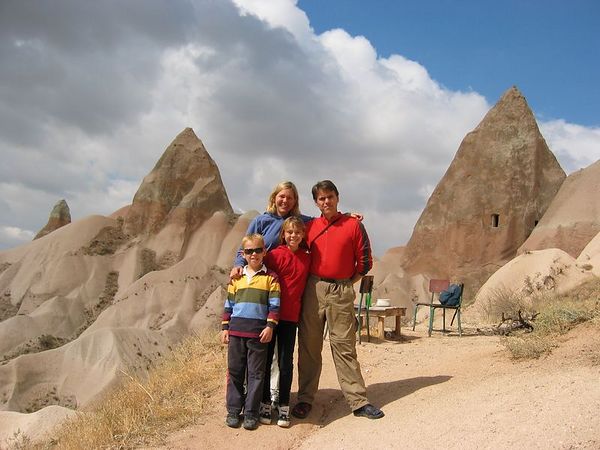How Do I Buy Plane Tickets?
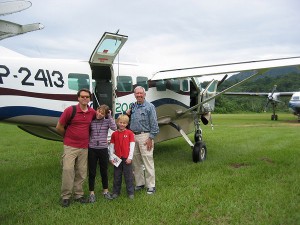 There are dozens of companies that specialize in around-the-world plane tickets. Googling the string “around the world plane tickets” will help you find them. Plan on at least $5K per person for airfare, and maybe even double that.
There are dozens of companies that specialize in around-the-world plane tickets. Googling the string “around the world plane tickets” will help you find them. Plan on at least $5K per person for airfare, and maybe even double that.
There is a product called an “around-the-world ticket” that generally allows you to travel around the world in one direction, make a specific number of stops and have flexible travel dates.
One problem we found with around-the-world tickets is that you cannot back-track. For example, the itinerary we laid out for ourselves had us flying primarily east, but occasionally we had to fly west. This isn’t allowed on a typical around-the-world ticket; those flight segments would have been simply out-of-pocket.
Another problem with around-the-world tickets is that they are generally all on one airline or airline alliance. For example, if you buy your around-the-world tickets on United, you can’t fly to Mauritius.
After doing much research on the subject, we finally committed ourselves to what are known as open jaw segments. Open jaw segments are a series of one-way tickets strung together connecting the dots on the globe you wish to visit. In the post 9/11 world, one-way tickets are hard to buy, so a good travel agent that specializes in around-the-world tickets is invaluable here. Again, Googling the string “around the world plane tickets” will help you find them.
With open jaw tickets you build your own itinerary and the only limitations are your budget and your imagination. The drawback is that you fix your travel dates in advance.
Ultimately we tired of having to hurry through a place to make our next travel date. When we flew into China, our flight in was to Beijing and our flight out was from Hong Kong. We didn’t really know what we would find when we traveled overland between those two points. Of course that is the fun of travel, but what we found between Beijing and Hong Kong warranted several extra days. Too bad for us – our travel date from Hong Kong had been set months in advance.
Our open jaw flight segments that we had pre-purchased ended in San Jose, Costa Rica, and we were looking forward to the flexibility this would give us during our time in Central and South America. Then the reality of trying to get on the flight of our choice at the last minute came back to haunt us. As we tried to fly from Panama to Chile, we found that our options were either to spend outside of our budget, wait in Panama almost four weeks until cheap seats were available, or choose another destination. This is how we first came to Bolivia – because we couldn’t get the flight we wanted to Chile.
How Do I Keep Costs Down?
 We stayed at a lot of hostels. Hostels are not as cheap for a family as you may think, because they charge per person, but the fact that they usually have a kitchen helps control costs if you use it instead of eating out three times per day. In Europe, hotels charge per person as well, so we brought a tent and used it a lot until Katrina broke her leg.
We stayed at a lot of hostels. Hostels are not as cheap for a family as you may think, because they charge per person, but the fact that they usually have a kitchen helps control costs if you use it instead of eating out three times per day. In Europe, hotels charge per person as well, so we brought a tent and used it a lot until Katrina broke her leg.
Another way we controlled costs was by eating out of grocery stores as much as possible – even when we had no kitchen to cook in. During our time in France, we ate at a restaurant exactly once. Instead we went to the Co-Op everyday and bought apples, cheese, ham, a baguette and the two vegetables that we could eat uncooked and kept well in bicycle panniers – a carrot and a red pepper. We ate like this far more often than I care to remember.
Admission prices can add up pretty quickly when you have to multiply by four. I really wanted to go see Westminster Abbey in London, but it was going to be $100 for the four of us, so I took pictures from the outside and then we took the Tube to Kings Cross Station and had our pictures taken at Platform 9¾, which was free.
Four months later as we left Europe, I had seen so many cathedrals, abbeys and palaces I couldn’t keep track of them and missing Westminster Abbey didn’t seem so important.
The point is, you have to set reasonable expectations. You can’t do everything. Decide what you want to do, and what you feel like you’d really regret if you missed. I looked at Europe as a whole and decided I would regret missing the Louvre and the Vatican – Westminster Abbey came in third. By contrast, the admission to those two former destinations combined is less than the latter, so the latter simply got bumped.
How Do I Save For a Trip This Big?
The easiest thing would be to marry well or arrange to inherit a trust fund. Failing that, plan on saving for years.
We started saving for this trip about ten years before we left. In those ten years we bought less expensive cars than we could otherwise afford and a smaller house than we could otherwise afford and we put the difference into savings.
Our kids heard us planning this trip since before they could talk. Our family mantra became, “Would we rather buy this, or go on our trip?” This applied even to minor expenditures such as clothing, not so much for the economic benefit as the psychological benefit that as a family, we were working toward our goal. Both kids became evangelical about cost cutting, sometimes to the point of being irksome, but it showed that we were united in our goal. In the end it was worth being scolded by an eight year-old for going to the occasional Giants game at AT&T Park.
How Do I Get Visas On The Road?
As we planned our trip we looked into the entry requirements for every country we planned to visit to see if we needed to arrange for a visa before we arrived at the airport. There were only two countries with this requirement: China and Russia. I wanted to go to Russia but timing was going to be tricky, because there were other places in Europe I wanted to see as well. Fitting Russia in to our travel plans was going to be tight. But when I considered this along with the visa requirements, I just couldn’t see how we could make it work. The visas were $100 each, so I wasn’t about to spend that kind of money if there was a chance we wouldn’t be able to fit it in to our plans. The lead time it took to obtain the visa meant “popping into the country for a quick visit” when we were in the neighborhood was out of the question. Consequently, Russia got written out of the itinerary before we ever acquired plane tickets.
I wanted to go to Russia but timing was going to be tricky, because there were other places in Europe I wanted to see as well. Fitting Russia in to our travel plans was going to be tight. But when I considered this along with the visa requirements, I just couldn’t see how we could make it work. The visas were $100 each, so I wasn’t about to spend that kind of money if there was a chance we wouldn’t be able to fit it in to our plans. The lead time it took to obtain the visa meant “popping into the country for a quick visit” when we were in the neighborhood was out of the question. Consequently, Russia got written out of the itinerary before we ever acquired plane tickets.
China was a different story. Visiting the Great Wall was simply one of those things we weren’t going to miss. All the information we could find told us we had to get the visa before we left our home country, but the visa was only good for 90 days. Our flight to Beijing was well past 90 days after we left on our trip, so that meant we had to get our visa while we were on the road.
We knew other people had done this, but how they did it was a mystery to us. We tried to get our Chinese visas in Rome and Istanbul from the Chinese Embassies in those countries, but we were told, none too politely, that we had to go home to get them. I even asked a close relative who was an important official at the US Embassy in Beijing try to pull some strings. It didn’t work.
Luckily, the Chinese Embassy in Tokyo will give an American a visa. We also found that it would have been simpler for us to get our Chinese visas in Hong Kong, but by the time we found this out, we already had purchased our plane tickets and Hong Kong came after Beijing.
How Do I Keep The Kids Entertained?
 This is an important consideration for the mental health of the group. If the kids are bored, everyone suffers.
This is an important consideration for the mental health of the group. If the kids are bored, everyone suffers.
Kids aren’t impressed by the same kinds of things that adults are. Furthermore you simply can’t do something fun every minute or even every day. There were plenty of days where the only goal was to get the laundry done.
To combat boredom we deployed books. For this reason, I wouldn’t recommend a trip of this type with children who are not yet good readers.
For an unusual insight into cultures that a typical traveler never sees, we also visited local amusement parks. The irony of a grim-faced Chinese man working the roller coaster wasn’t lost on the kids — neither was the smile we finally were able to coerce out of him. The contrast between Wild Wadi Water Park in Dubai versus the water park in Dar es Salaam, Tanzania, was a good catalyst for a lesson on how people are the same, yet different.
What Do I Do About Medical Insurance?
We wanted medical coverage for accidents and diseases such as malaria, as well as protection for something chronic like cancer.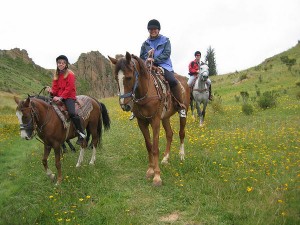 There are companies that specialize in travelers’ insurance. Googling the string “travelers’ insurance” will help you find them.
There are companies that specialize in travelers’ insurance. Googling the string “travelers’ insurance” will help you find them.
Travelers’ insurance is much less expensive than a typical health insurance policy in the U.S. For example, the type of insurance provided by many U.S. employers would be several hundred dollars per month, per person. For us, that was simply out of the question.
Since most people are unlikely to see a doctor in a foreign country while traveling, travelers’ insurance works on the basic assumption that you are not going to seek medical care unless you are really sick or injured.
Travelers’ insurance also accounts for the fact that health care the world over is much less expensive than it is in the U.S. Because of this, travelers’ insurance is typically valid for any country in the world, except the U.S.
We paid about $2,600 for 12 months of coverage overseas for four people, plus one month of additional coverage inside the U.S. once we returned. This gave us $1 million in coverage with a $250 per person deductible.
Our policy did not pay for itself, even with a broken leg. But I wouldn’t have stepped on a plane without it.
What Would You Do Differently?
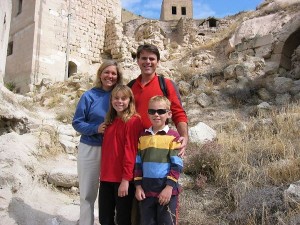 Not much, really. The only thing I truly regret is returning to the blasted climbing rock near Zermatt, Switzerland, where Katrina broke her leg. I also regret not being more aggressive with taking pictures.
Not much, really. The only thing I truly regret is returning to the blasted climbing rock near Zermatt, Switzerland, where Katrina broke her leg. I also regret not being more aggressive with taking pictures.
In retrospect, I wish we had spent less time in a few places, so that we could have spent more time in other places. But there is no way to know these kinds of things in advance; it is one of the frustrations about traveling that anyone with limited time, even if it is a year, has to accept.
For some folks there may be a clear advantage to liquidating all assets before embarking on a journey of this magnitude. There were many, many occasions when I was pulling my hair out trying to manage affairs at home from afar; the notice I received from the IRS asking questions about the previous tax year was one of the more choice frustrations.
Do not underestimate the frustration of the seemingly simple act of making a telephone call in some parts of the world.
To sum up, the implications of leaving an asset such as a house behind versus selling it should be carefully considered.
What Medications Should I Bring?
Our family doctor helped us out here. We simply asked him for his advice and he gave us prescriptions for several future and likely scenarios: Cipro, for diarrhea, was the only thing we actually used. It is straightforward to buy Cipro in most countries without a prescription.
What Immunizations Do I Need?
 We scheduled a visit to our doctor a month before we left to get inoculated against Yellow Fever, Hepatitis A and Typhoid as well as getting boosters for tetanus. We received a double-edged surprise.
We scheduled a visit to our doctor a month before we left to get inoculated against Yellow Fever, Hepatitis A and Typhoid as well as getting boosters for tetanus. We received a double-edged surprise.
First, we didn’t know how expensive it would be – over $2,000 for our family of four. That was a surprise for our budget. Since it was “elective” care, it wasn’t covered by our insurance.
The second surprise we got was that to be effective, we needed a hepatitis booster 90 days later, but we would be on the road by then.
We ended up getting our hepatitis booster in Turkey. We found that we didn’t need to see a doctor to get the shot, as we could get this at any pharmacy. As it turned out, we received our booster shot while standing in line at the counter of a pharmacy in Çesme, Turkey, alongside people waiting to pay for their laxatives and toothpaste.
There were more surprises, too. We wanted to get malaria pills because Tanzania was a malaria zone. Our doctor recommended the drug Malarone to us. It was $200 per person for a one month’s supply. There were cheaper malaria medications, but they all sported nasty side effects.
On our doctor’s advice we decided to wait and buy our malaria medication overseas, where he thought it was likely to be cheaper. We found that Malarone wasn’t cheaper in Europe, and simply not available in Turkey or in the United Arab Emirates. So we picked up a supply of the inexpensive nasty side-effect kind of malaria pills before we left Dubai. Fortunately, we experienced none of those nasty side-effects.
How Do I Battle Travel Fatigue?
About once a week or so we gave ourselves what we called a P-Day (Preparation Day). On our P-Day we did our laundry, wrote e-mail home, went to a movie, or read books.
Toward the end of our trip, P-Days came more frequently and often lasted more than one day. At some point saturation sets in and you don’t really care to see another waterfall or church built in 1561.
But battling travel fatigue is more than just a weekly P-day. During our year we also scheduled a week at the beach or a cabin in the mountains with no agenda other than recharging our batteries.
Would You Do It Again?
You have to be kidding me. If you had to ask that, you didn’t read the book.
Yes. In a heartbeat. When the kids are grown and out of college September and I will strike out again on our own. Next time we will go around the world north to south instead of west to east.
How Do I Carry Cash?
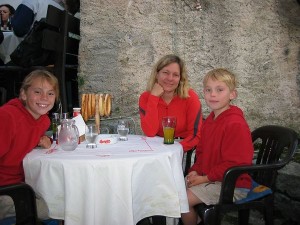 We didn’t. Only very rarely did I ever carry more cash with me than I could tolerate losing if I were mugged. For example, when we were in Tanzania we had to pay our safari operator in cash; the tour operator arranged bodyguards to accompany me to the bank.
We didn’t. Only very rarely did I ever carry more cash with me than I could tolerate losing if I were mugged. For example, when we were in Tanzania we had to pay our safari operator in cash; the tour operator arranged bodyguards to accompany me to the bank.
The only other time I carried a lot of cash was in Bolivia when we took our Unimog adventure over the Andes. We had to pay for services along the way and there were no facilities for getting cash enroute.
Nevertheless, when we found ourselves in certain places where we felt an elevated risk of pickpockets, such as the Covered Bazaar in Istanbul, we divided our cash and credit cards equally among the four of us.
We rarely felt threatened, although I was pretty nervous almost everywhere in Arusha, Tanzania. Once in Panama City we wandered into a bad neighborhood and were warned to get out (by two separate residents and also the police within a two minute period). The only time we had any real problem was on the subway in Rome. While we didn’t feel the threat of bodily harm in Rome, twice in the same day we had pickpocket attempts. Only the vigilant guarding of each other saved us from being robbed.
How Do I Get Cash?
Mostly from ATMs. This worked great in Europe, Turkey and the UAE. Unfortunately this lulled us into a false sense of availability that backfired once we landed in Tanzania. After the Lushoto, Tanzania debacle (thank you, villagers, for rescuing us), we were pretty careful to always have a supply of traveler’s checks with us. We also learned to ask locally about ATM and bank availability before traveling into remote areas, because traveler’s checks aren’t universally accepted.
As noted above, relying on ATMs works well in Europe. It also works well in most parts of Asia, including mainland China. We knew before going to Cambodia that there were no ATM services in the country, so we relied upon traveler’s checks there.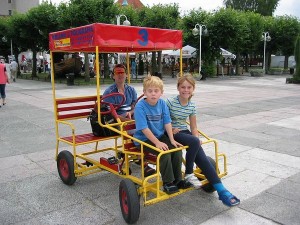 One big surprise was Central and South America. While ATM machines are plentiful, our Cirrus and Star system cards were almost universally rejected continent-wide, even at machines specifically advertised to be on those networks. Slipping a credit card into the same machine, however, would almost always work – even though the credit card was also on the same network.
One big surprise was Central and South America. While ATM machines are plentiful, our Cirrus and Star system cards were almost universally rejected continent-wide, even at machines specifically advertised to be on those networks. Slipping a credit card into the same machine, however, would almost always work – even though the credit card was also on the same network.
On the subject of credit cards, we carried three pairs of cards issued to both John and September, for a total of six cards. I would carry with me card “A” issued in my name. September’s card “A” was kept with our passports. In a like manner, September carried card “B” with her, and my card “B” was with our passports. The rarely used pair of cards “C” was also with our passports.
This strategy was to minimize our risk in the case of lost or stolen cards, but also to protect ourselves if a bank decided to freeze our account due to “suspicious” charges.
Finally, we left letters on file with our bank and credit card companies with our rough itinerary and contact information.
How Do I Pay Bills?
I set up all my recurring bills for auto-payment, and then managed my accounts electronically over the web. My mortgage holder, for example, never knew I was out of the country.
For non-recurring bills, I used Checkfree, a bill paying service that my bank worked with seamlessly. Everything was managed remotely using the Web. I then had a trusted family member handling my day-to-day mail and we kept in contact via e-mail for bills that might pop up.
All I needed to manage my finances remotely was an internet café. The only country where I found it difficult to find an internet café was in England. In fact, my experience was that the poorer the country, the more internet cafes are available.
How Do I Stay Connected?
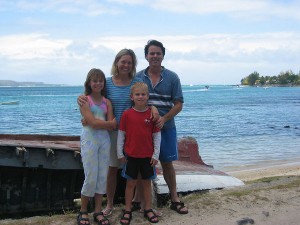 Being a geek, I agonized over this one. I wanted a computer. I wanted a satellite phone. Both would have been immensely useful. I brought neither.
Being a geek, I agonized over this one. I wanted a computer. I wanted a satellite phone. Both would have been immensely useful. I brought neither.
It was a matter of bulk. The issue of bulk first reared its ugly head during one of our training rides. We had taken several long-distance self-contained bike rides before we attempted to ride from London to Istanbul. One such ride was to circle the island of Maui. Anyone who has been on the backside of Maui knows how remote it is. Let’s just say that we realized we couldn’t eat a computer when we were tired and hungry and there were no stores around.
It was basically the same story for a satellite phone. I have a professional connection with one of the satellite phone services, and they offered a phone to me for our trip, but I had to decline because of size and weight. More than once I wished I had it, but we survived.
For a computer, I took a state-of-the-art PDA and a wireless keyboard. This was a fantastic solution and one I heartily recommend. The device I brought had Wi-Fi and Bluetooth connectivity. I used this “e.brain” for keeping a journal, playing chess, keeping documents handy, e-mail, web browsing and just about anything you can do with a computer.
Occasionally it was a bit annoying when I wanted to move files off of my e.brain to my FTP server for archiving. To accomplish the task of moving files I took the Swiss-Army Knife approach to connectivity, employing as many and as diverse ways to move files as aftermarket technology would allow. It wasn’t always straightforward, but I always found a way to transfer files to and from my device.
For voice, I bought a simple “pay as you go” cell phone in London. I then bought a new GSM card for the local network as we made our way around the world. This solution worked OK. The obvious problem was typical cell phone coverage issues. The not-so-obvious annoyance was arriving in a new place, needing to make phone calls for things like finding accommodations, but not being able to because the GSM card in my phone wouldn’t roam on the new network.
My rule of thumb, “Don’t bring more than you want to carry, nor anything more expensive than you’re willing to have stolen” applies to zippy electronics as much or more than any other equipment.
Finally, if you are not traveling with a PC or handheld computer but still want to be able to access electronic documents on the road, e-mail them to yourself using an account that you can access over the web. Set up folders under your inbox and file them away until you need them. In this manner you can easily find and access this information from any internet café in the world. Of course this applies not only to travel information but all types of data from copies of passports to insurance information.
